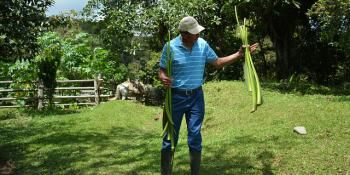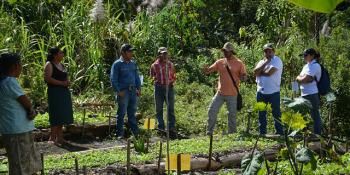Raising Awareness on Climate Change and Food Security in Ethiopia
Guest blog by Laura Cramer, Program Specialist for CCAFS East Africa Regional Office
In early July CCAFS East Africa Regional Theme co-sponsored a national awareness raising conference at the Ghion Hotel in Addis Ababa, Ethiopia titled “Climate Change Vulnerability and Risk Assessment of Agriculture and Food Security in Ethiopia: Which Way Forward?” The co-hosts of the event were the Ethiopian Ministry of Agriculture (MoA), Climate Change Forum – Ethiopia (CCF-E), and the United States Agency for International Development (USAID).
More than 150 decision makers from Regional and Federal governments, experts from research institutions and universities, and practitioners from civil society organizations and the private sector came together for expert presentations and plenary discussions on the impacts that climate change will have on agriculture and food security in the country. Journalists from local television and newspaper outlets were also in attendance to cover the event and interview key attendees.
The conference was officially opened by His Excellency Mr. Sileshi Getahun, State Minister, Ministry of Agriculture. In his opening statement, H.E. Mr. Sileshi stated that Ethiopia is already facing drought-induced food and water insecurity as a result of climate change, but that the country is determined to convert these challenges into opportunities. The country has ratified international climate change related instruments and prepared national adaptation and mitigation plans. He stressed the need for collaborative actions to support resource poor farmers to be better prepared to fight climate change and achieve food security. Additional welcoming remarks were given by CCF-E Executive Director Dr. Girma Balcha and CCAFS East Africa Regional Leader Dr. James Kinyangi.
Thirteen scholars were selected to present on a wide range of topics addressing the many ways that Ethiopian agriculture and food security are vulnerable to climate change and climate variability. The presented papers (listed below) are currently being reviewed and revised and will be published as a volume of proceedings later in the year.
- Climate Variability and Climate Change Impacts on Crop Yields and Crop Productivity in Ethiopia.(Dr. Adefris Teklewold, Ethiopian Institute of Agricultural Research)
- Trends in Agricultural Input Supply and Use in Ethiopia (Mr. Techane Aduguna, UNDP)
- Developing Agricultural Water Management Practices to Enhance Food Production in Ethiopia (Mr. Hune Nega, Ethiopian Ministry of Agriculture)
- Sustainable Land Management for Promoting Food Security in the Face of Climate Change (Mr. Daniel Denano, Ethiopian Ministry of Agriculture)
- Potential for Up-scaling the Availability and Utilization of Agro-meteorological Information for Managing Climate Risk in Smallholder Agriculture (Mr. Tesfaye Gissila , National Meteorology Agency)
- Climate Change and Trans-boundary Issues (Dr. Gemedo Dalle Tussie, Institute of Biodiversity Conservation)
- Transitions in Pastoral Practices and Livelihoods under Changing Climate in Southern Ethiopia: A Case Study (Dr. Solomon Desta, Managing Risk for Improved Livelihoods)
- Assessment of Socially Disaggregated Impacts of Climate Variability and Climate Change (Dr. Senait Regassa, Oxfam America)
- Forestry and Agro-forestry Land Use for Adaptation to and Mitigation of Greenhouse Gas Emissions (Dr. Zewdu Eshetu, Ethiopian Institute for Agricultural Research – Forestry Directorate)
- Assessment of Agro-biodiversity for Food Security and Climate Change Adaptation (Dr. Alganesh Tesema, Institute for Biodiversity Conservation)
- Mitigating the Impacts of Climate Change and Climate Variability on the Livestock Sub-sector (Dr. Getachew Gebru, Managing Risk for Improved Livelihoods)
- Food Security Policy for Adapting to Climate Change in Ethiopia (Ms. Selam Kidane , Environmental Protection Agency)
- Mainstreaming of Climate Change, Agriculture and Food Security Related Policies through a National Development Planning Process (Mr. Wondwossen Sentayehu , Environmental Protection Agency)
The papers were presented in a total of five sessions, and questions and comments from participants were taken after each session. To help prioritize key issues raised from the presentations and discussions, participants were divided into five groups in the afternoon of the second day to discuss which issues should be given precedence in future research agendas. Suggestions included supporting community-based adaptation strategies, increasing investment in water harvesting for complete and supplementary irrigation, and protection of mobility for pastoralists, along with improvement of rangeland development. It was also agreed that gender issues must be central in agricultural adaptation plans and policies. An issue raised multiple times is the need to build the capacity of the National Meteorological Agency to produce downscaled modeling data for dissemination to farmers. CCAFS is working with local partners to help conduct some of this research, with the aim of reducing the risks and vulnerabilities of Ethiopian agriculture and food security to climate change.
View more pictures from the conference down below:


